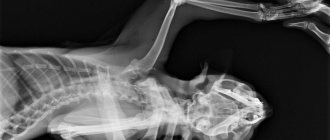According to animal rights activists, there are between 7 and 40 million stray cats in Russia today. The problem is especially acute in winter. With the onset of cold weather, animals tend to warm basements, but residents of houses are not always happy with such a neighborhood. Four-legged animals are evicted, and sometimes they can simply be walled up.
Nina Sergeevna Smirnova remembers how she cared for cats brought to the city immediately after the blockade. Grandma continues to take care of animals today. There are five wards on allowance; they all live in the basement of the house. Nina Sergeevna resettled her pets on her own. “Let me walk around the yard, call them: here, here. They are sitting, poor, trying to eat, but they don’t know where to go,” says the pensioner. Now the tailed animals have gotten used to it and already recognize their nurse by sight.
Previously, cats lived under a nearby business center. However, the owners evicted the uninvited guests, and the ventilation window - the only passage - was sealed. The cats were not ready for street life. Two people were hit by a car. The situation outraged the volunteers who cared for these animals. Activists even wrote a letter to the district administration. But, as the businessmen explained, they were guided only by security measures. “This is a heating station. There are electrical installations and pipes with boiling water; it’s dangerous for animals to be there,” says manager Yulia Nazarenko. With the onset of the heating season, such situations are repeated in many city houses.
Population is growing
Today there are more than 20 thousand stray cats in St. Petersburg. They are trying to control the number. For example, in 2022, tailed animals were included in a free sterilization program. Only the project does not involve catching. “This is a pilot contract, a trial one. To see what we will encounter during the work. Therefore, the volume is small,” explains Elena Mezentseva, deputy general director of the veterinary hospital. “Hunting” for four-legged animals is still left to compassionate citizens. And this really slows down the process. Before being taken to a homeless animal shelter, cats undergo a full examination. The four-legged animals receive all necessary vaccinations. The procedures are not cheap - the average Murka or Barsik costs 20 thousand rubles. In the fall, tailed animals begin to be brought here en masse from the streets, from the basements of houses; there is absolutely not enough space. “It’s almost impossible to surrender an animal; no one is waiting for you with open arms. The shelters are overcrowded,” explains Olga Titovich, a representative of the institution.
Changing Animal Behavior
Sensing the imminent approach of winter, cats turn on energy saving mode. No matter how active and playful a pet is, with the onset of the first cold weather it turns into a couch potato, spending most of the day on a soft bed or near a warm radiator. This behavior is especially typical for four-legged dogs with short fur. They prefer to make themselves a cozy nest somewhere in the closet or crawl under the blanket.
With the approach of cold weather, cats' appetite increases, and even little ones with tails are not averse to once again enjoying the treat offered by their owners. As noted earlier, the increased interest in food in these animals is associated with the need to increase the layer of subcutaneous fat, which will help them survive in the most severe frosts. There is no need to worry about this, much less put your pet on a diet. When difficult times pass, his appetite will normalize, and his weight will gradually return to normal.
Houses in the yard
In St. Petersburg, activists, together with representatives of the public council, developed an alternative - the “Catification of Yards” project. Cats are provided with comfortable conditions using insulated winter houses. They are made from wood. One wall of such a COTTAGE must be adjacent to the heating plant - so that the comfortable temperature is maintained all winter. The dwelling can accommodate up to 10 basement dwellers and does not take up much space. The asking price is about 12 thousand rubles, but not everyone is ready to pay.
Photo: Cat Cafe “Republic of Cats”
But is it possible for cats to stay in basements for the winter? The Housing Code of the Russian Federation states: “The maintenance of such premises must ensure that stray animals, synanthropic rodents and birds do not enter them.” This wording is the reason for eviction. However, the article clarifies that basements “are the common property of an apartment building.” Therefore, the last word always remains with the owners. The Civil Code takes the side of cats. It explains that the residents themselves decide whether to leave the tailed animals in the technical rooms or not. The main thing is that nothing threatens the health of the animal. But residents of the house often do not know their rights, and for management companies it is much easier to evict an animal onto the street than to take care of it.
On January 1, 2022, part of the Federal Law “On the Responsible Treatment of Animals” came into force. The principle of innovation is simple: animals are capable of experiencing emotions and physical suffering. Therefore, you need to treat them accordingly. Now four-legged animals cannot be abandoned on the street - they can only be transferred to special institutions. Animal activists hope that in the future this will help reduce the number of stray cats.
Winter is coming, which means cats need to find a roof over their heads. Everyone can help the tailed ones. For example, if your basement is safe for your furry neighbors, you need to create comfortable conditions for them: provide a place for feeding and, if possible, sterilize, and also make sure that the animals do not have access to food waste. In return, little hunters will protect the territory from rodents.
The other side of winter
And somewhere in the sky, one can imagine, a blizzard sleigh with Santa Claus and gifts is rushing.
Is it true? Do you know that everything around you freezes in winter? And sewer manhole covers, heating pipes, clogged and welded basement vents become the last refuge of someone’s souls, whose entire fault is human betrayal
Winter…
Have you ever slept outside in freezing temperatures all night? And in the morning continue the battle with death, playing out another day, hour, minute? Snow falls. Snow... Just someone's ice shroud. Someone's grave. A sign that everything is over... A sign of how much it hurt!
The announcement photo shows a monument to human inhumanity. The kitten sat on the porch of the store for three days. And so he froze, burying his nose in the snow. But it was so easy to save the cat...
Of course, not with empty lines: “Help, save / everyone except me” and “What bastards, they didn’t help, but I’m so worried.”
So.
What to take with you to the dacha from animal things?
Bring a collar and leash. The dog will be able to walk around the area without these accessories. But in case you decide to take a walk around the countryside, they will come in handy. Make sure there is an address tag on the collar. In case your pet gets lost or suddenly runs away.
Don't forget to buy a special collar that will help protect against unwanted parasites for a long time.
Take a vet kit with you. Put first aid supplies there: disinfectants (hydrogen peroxide, brilliant green), dressings, flea and tick repellents. Since your stay is planned to be long, you can take activated charcoal, antibiotics, painkillers for animals, and eye drops. If your dog or cat suffers from a specific chronic disease, do not forget to put the necessary medications recommended by your veterinarian in your first aid kit.
When leaving for the dacha, take with you animal hygiene products, a comfortable bed or a familiar blanket, toys, bowls, and a scratching post. For the cat - a tray and the usual litter. Familiar things and smells will help you quickly adapt to an unfamiliar place. Don't forget about your favorite food.
LiveInternetLiveInternet
—Tags
—Categories
- DIY household chemicals (17)
- crochet (1420)
- knitting and more (339)
- money (175)
- for home, for family (271)
- wonderful people (20)
- health (462)
- interior (121)
- cats (67)
- creative (120)
- cooking (399)
- culture and education (62)
- Masikam (337)
- shoes (42)
- vegetable garden (127)
- vegetable garden on the windowsill (35)
- rest (0)
- DIY perfume (9)
- weaving (143)
- from the world by thread (451)
- sewing and embroidery (200)
- humor (20)
How to help a frozen animal?
If your four-legged pet is very cold, you need to start normalizing its body temperature as quickly as possible. In some cases, the slightest delay can cost the animal its life. The actions of the owner of a frozen pet are as follows:
- Wrap the cat in a warm blanket or terry towel. To warm it up faster, you must first hold the blanket on the radiator.
- Place your four-legged pet wrapped in a blanket on a bed near the radiator. Other sources of heat would be useful - heating pads, bottles of hot water, which should be placed around the four-legged frostbite.
- Close all windows and doors in the room in which the frozen animal is located. There should be no drafts in it.
- Dry your pet's fur with a hairdryer if it gets wet in the rain or snow.
- Stay close to the cat until it warms up.
- Feed the warmed animal warm, preferably liquid food.
What you should not do in this situation is try to warm your four-legged pet in hot water. Water procedures in this state are strictly contraindicated for him. He will only freeze even more and may get a serious cold.
In case of severe frostbite, veterinary attention is required. A frostbitten four-legged patient will be prescribed IVs with warm solutions, warm pleural lavage, the use of a ventilator to normalize body temperature, and the use of analgesic veterinary medications that relieve pain while restoring tissue sensitivity. Subsequently, a comprehensive examination of the pet will be required to assess the condition of the internal organs.
Source
How can you tell if a kitten or adult cat is cold?
The condition of the body in which the body temperature drops below that required to maintain life processes is called hypothermia. The following symptoms indicate it:
Prolonged hypothermia of the body of a kitten or adult cat leads to a decrease in the concentration of glucose in the blood. The pet's muscles freeze, heart rate and breathing slow down, and it stops responding to external stimuli. As the animal's condition worsens, the animal collapses, which turns into a coma. If the body is too hypothermic, the cat may appear dead, because its pulse and heartbeat cannot be heard.
How to wash pets at the dacha?
The chances of finding dirt or staining your fur coat at the dacha increase significantly. After all, in addition to dust, dirt and burrs, a cat or dog can bring fleas, ticks and some other nasty things. Therefore, you need to be prepared for bath procedures.
If there is a bathtub at your dacha, you can start washing in it. The rest of the procedure is standard, as in the apartment. If there is no bath, use a basin for washing.
The water temperature should not be higher than 37-38°C. If it’s cooler, it’s okay, the main thing is not too hot. Cats, for example, react worse to high water temperatures. And don't run a full bath. Let the water reach your stomach or slightly cover your sides.
Option three - dry products. These are special sprays and powder shampoos for washing animals. Dry shampoos are made from talc and are poured onto the coat, rubbed in lightly, and then brushed out with a stiff brush. This method, although it takes more time, can be very convenient in country conditions.
As you can see, organizing the move and stay of pets at the dacha is not so difficult. But they will certainly brighten up your stay outside the city and lift your spirits on long winter evenings. Have a nice winter!
How to prepare your pet for moving?
Expanse and fresh air will surely appeal to the animal. However, before you start packing, take care of the health of your dog or cat.
For preventative purposes, do not forget to treat for fleas, worms and ticks.
Be sure to get all required vaccinations. It is advisable to do this at least a month before leaving for the country in order to strengthen the immune system. Don't forget your rabies vaccination. Outside the city, the likelihood of contact with animals infected with a deadly disease - foxes, hedgehogs, mice - is quite high. Vaccinations against lichen, as well as viral diseases, will also not be superfluous.
Take vitamins and special supplements with you if your purebred dog or cat does not have good immunity.
It is better not to take sick animals, elderly cats that have never left the apartment to the dacha (this can become serious stress for them), as well as aggressive pets, small puppies and kittens under 3 months of age.
If the animal has any chronic diseases, consult with veterinarians regarding further stay at the dacha.
Perform your usual skincare routine. If you regularly visited the groomer in apartment living conditions, take care of this before leaving for the country. Update the haircut, clean the animal's ears and eyes.
Put the dog on a chain?
Here opinions differ. Some people think that this should not be done for a city dog. Some people, on the contrary, are in favor of keeping them on a chain so that the dog does not run away and get lost in an unfamiliar area.
A city dog cannot sit on a short chain. She won't understand why she can't be around you and will start to get nervous. Therefore, only leash your city dog if absolutely necessary.
If the area is securely fenced, the chain can be abandoned. If not, and there is a high risk of “escape” or, conversely, the appearance of other animals that may frighten the dog, it is worth considering the option of a chain. But the appearance of free movement should be created. To do this, stretch a long, strong rope or wire between two widely spaced posts and use a carbine to attach another rope or chain of the length you need. And tie the dog to this rope. The dog will run freely, for example, along the fence and will not languish in restrictions.











